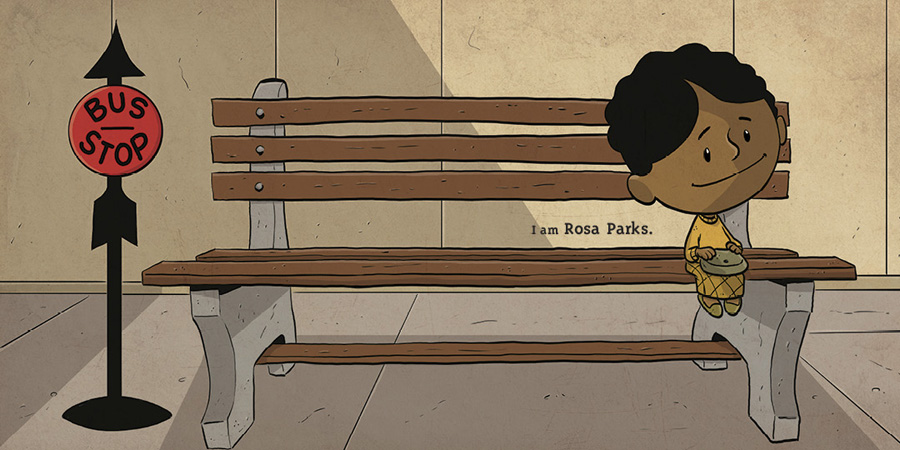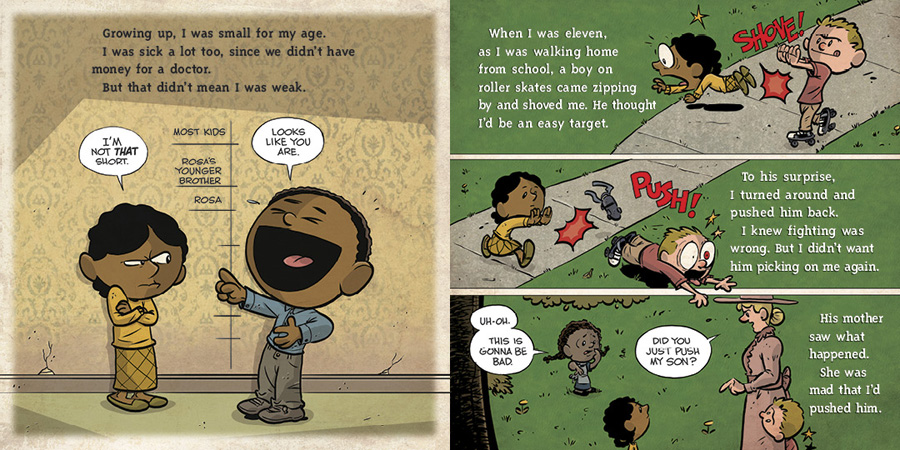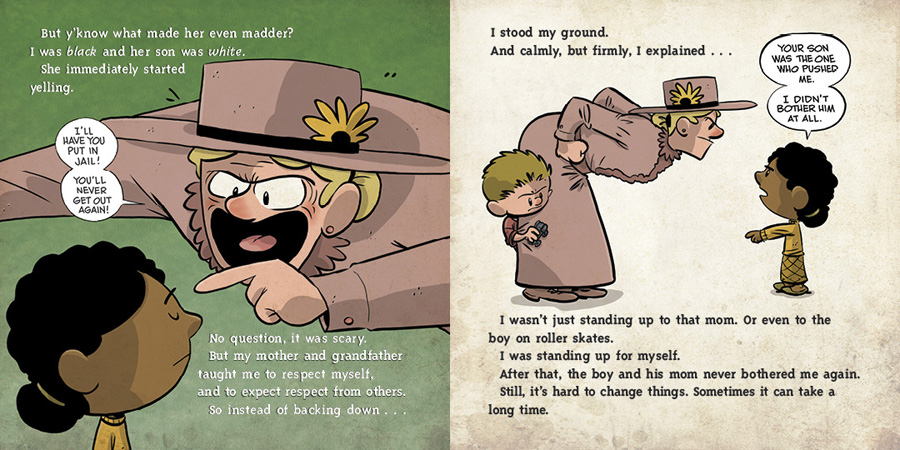Rosa Parks has a very specific image in the popular culture: the kind, elderly woman ... a "quiet seamstress" who sat down on a bus because she was tired after a hard day's work. It's a good story, right? Let's be honest: it's a great story. But when I shared it with my daughter, I realized -- it's not the full story.
Rosa Parks wasn't some meek old lady or even the "quiet seamstress" that history has held her out to be. She was a strong, fierce fighter. And she always was, ever since she was little.
When Rosa Parks was eleven years old, a young boy came zipping by on roller skates and shoved her, knocking her down. He probably saw her as an easy target. Rosa was small for her age and often sick. But the real reason the boy shoved her? He was white, and Rosa was black.
In that moment, what did young Rosa Parks do? To the boy's surprise, she turned around and shoved him back. She wasn't looking for a fight. She just didn't want the boy picking on her again. As soon as it happened, the young boy's mother came running, screaming in Rosa's face. She threatened to have Rosa thrown in jail for the rest of her life. But the real reason the mom was so mad? Her son was white, and Rosa was black.
Was Rosa scared? Of course she was. But she somehow remained calm. Rosa's mother and grandfather had taught her to respect herself and to expect respect from others. Firmly, Rosa explained that the boy was the one who had shoved her first. On that day, when she was just eleven years old, Rosa wasn't just standing up to that woman. She was standing up for herself.
I wanted my daughter to hear that story. I wanted my sons to hear that story. In fact, it was stories like that that convinced me to write a series of children's books about America's heroes. I wanted my kids to see more than princesses and sports figures. I wanted them to see real heroes--Rosa Parks... Abraham Lincoln... Amelia Earhart--people no different than themselves, who found the courage to do extraordinary things.
For that reason, each book tells the story of a hero when he or she was a child. So the book is not just about Rosa Parks being famous--but her being just like us. And it was in doing the research for the book that I saw how much our culture had rewritten Rosa Parks's story.
Over the better part of a century, we turned Rosa Parks into America's grandmother, an old lady with spectacles. In fact, Rosa Parks was only forty-two when she took her seat on that famous bus.
And make no mistake, she was always tough. As a young girl, she and her black classmates would bring home their books every day because they thought that people would burn down their schoolhouse. She remembered staying awake with her grandfather, who had his gun in hand, waiting for the KKK to attack. In her autobiography, she even wrote that she wanted to see that fight.
As she grew up, yes, Rosa became a seamstress. But she also started working with the NAACP. She fought for fairer laws and interviewed those who had been treated unjustly. She wanted to make sure their stories were heard. At the time, she stopped using the "colored" water fountains. She'd rather go thirsty than be treated so poorly. It was the same with separate elevators. Instead of riding them, she took the stairs. But somehow, over the years, America kept focusing on that part about the kindly seamstress.
It was the same with the Montgomery bus driver who told Rosa to give up her seat. Few people know that Rosa had faced that bus driver before. Years earlier, she had entered his bus through the front door since the back door was too crowded. He had grabbed her by her coat sleeve and threw her off. So on that fateful day when Rosa Parks took her famous seat, she wasn't just making history. She was standing up to a racist she had faced before.
But again, somehow, history turned her into the kindly old grandmother. Which begs the question: Why? According to Michele Norris, host and special correspondent with NPR, and the founder/curator of The Race Card Project, when the history of the Civil Rights movement
became codified in the early to mid-70s, it was the era of Nixon, Angela Davis, and Vietnam protests. "Anything that had a revolutionary patina did not go down easy." As a result, "some of the edges of [Parks's] story were rubbed away" and the more militant aspects were usually not included in the narrative.
It was also a time period in which it was uncommon to see women in leadership roles, controlling their own destiny. Norris states, "The idea that [Parks] was fragile made her story even more interesting. Yet she wasn't just fragile. She was deep, she was intellectual, she was complex, and she wasn't perfect."
A few years ago, my own grandmother passed away. Like most grandmothers, she was so sweet and gentle during those final years of her life. But make no mistake, throughout her life, she was a loud, argumentative, scene-stealer. That was the "real her." Only in her final years did we turn her into someone else.
It's time to turn Rosa Parks back into the outspoken activist she really was. When I tell my daughter the story of Rosa Parks, I want her to know that Rosa Parks was a fighter who battled for the changes she wanted in this world. I want her to know that she wouldn't back down. And I want her to know it didn't start with a bus. It started when she was just a child being pushed by a boy on roller skates.
Does that lessen Rosa Parks in some way? Not a bit. According to Norris, we need to keep continuing to tell Rosa Parks's story. "With each repetition, we should go deeper. So when you learn about Rosa Parks, you should learn about the woman before her. And so much else." As Norris points out, it's a part of the African tradition of storytelling: "With each retelling, it becomes more rich."
So what do I tell my daughter? The only thing I know for sure: No one is born a hero. All hero stories begin the same way--with people just like you and me.



_________
Brad Meltzer is the #1 New York Times bestselling thriller writer of The Inner Circle, and the host of Decoded on the History Channel. His non-fiction children's books include I Am Amelia Earhart, I Am Abraham Lincoln, and his newest, out Tuesday, I Am Rosa Parks.